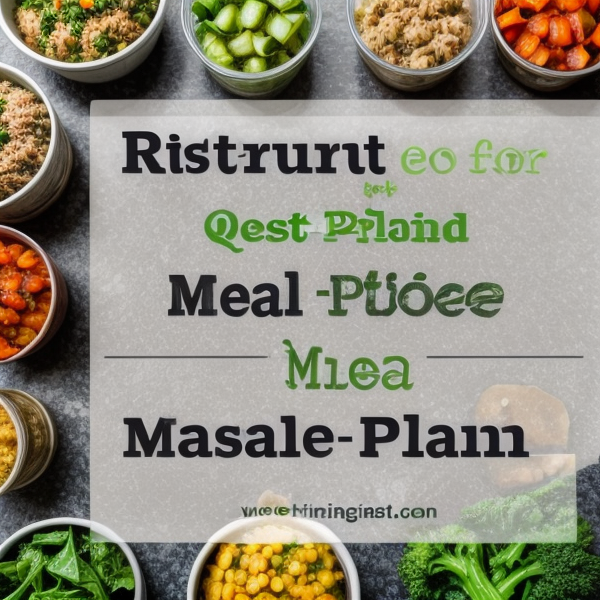Tips for Plant-Based Meal Prepping and Planning

Title: Tips for Plant-Based Meal Prepping and Planning
Introduction:
Meal prepping is an essential part of maintaining a healthy, balanced diet, especially when you’re following a plant-based lifestyle. By taking some time to plan and prepare your meals in advance, you can save money, reduce stress, and ensure that you’re fueling your body with nutritious foods. In this article, we’ll share some tips for successful plant-based meal prepping and planning.
1. Stock up on staples:
Having a well-stocked pantry and fridge is key to making meal prep easier and more efficient. Some essential plant-based staples include:
* Whole grains (brown rice, quinoa, barley, etc.)
* Legumes (beans, chickpeas, lentils, etc.)
* Nuts and seeds
* Fresh fruits and vegetables
* Olive oil, vinegar, and other healthy fats
2. Plan your meals:
Before you start cooking, take some time to plan out your meals for the week. This will help you avoid last-minute trips to the grocery store and ensure that you have all the ingredients you need. You can use a physical planner or an app like Mealime or Yummly to create your meal plans.
3. Choose easy-to-prepare recipes:
When it comes to meal prep, simplicity is key. Look for recipes that require minimal effort but deliver big flavor. Some great options include:
* Quinoa bowls with roasted vegetables and a simple vinaigrette
* Lentil soup made in the slow cooker
* Stuffed sweet potatoes filled with black beans, rice, and veggies
4. Cook in bulk:
Once you’ve chosen your recipes, double or triple the batch so you can enjoy leftovers throughout the week. This not only saves time but also reduces food waste.
5. Prep your produce:
One of the most time-consuming parts of meal prep is preparing fresh fruits and vegetables. To make this process faster, try washing and chopping your produce ahead of time. You can even roast large quantities of vegetables at once and portion them into individual containers for later use.
6. Invest in storage containers:
Having the right storage containers is crucial for keeping your meals fresh and organized. Look for containers that are airtight, leak-proof, and BPA-free. Glass containers are a great option as they allow you to see what’s inside and are easy to clean.
7. Label and date your containers:
To avoid confusion and waste, label each container with the name of the dish and the date prepared. This will help you keep track of which meals are still good and which ones need to be used first.
8. Don’t forget snacks:
When you’re meal prepping, it’s important to remember to plan snacks as well. Packing healthy snacks like trail mix, fruit salad, or homemade energy balls can help you stay fueled and satisfied throughout the day.
9. Make it fun:
Meal prep doesn’t have to be a chore. Get creative with your recipes and try new things. Experiment with different seasonings, spices, and sauces to add flavor without adding calories. And don’t forget to share your creations with friends and family!
Conclusion:
By following these tips, you can simplify your life and embrace a healthier, more sustainable way of eating. With a little bit of planning and preparation, you’ll be well on your way to enjoying delicious, nutritious plant-based meals all week long.
